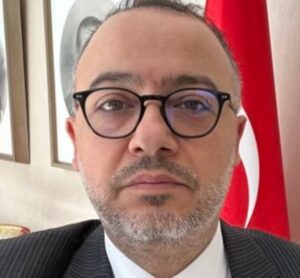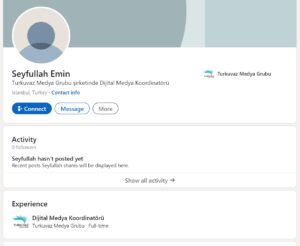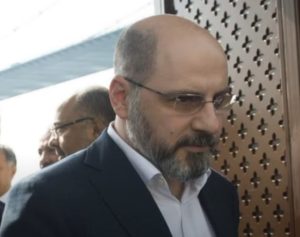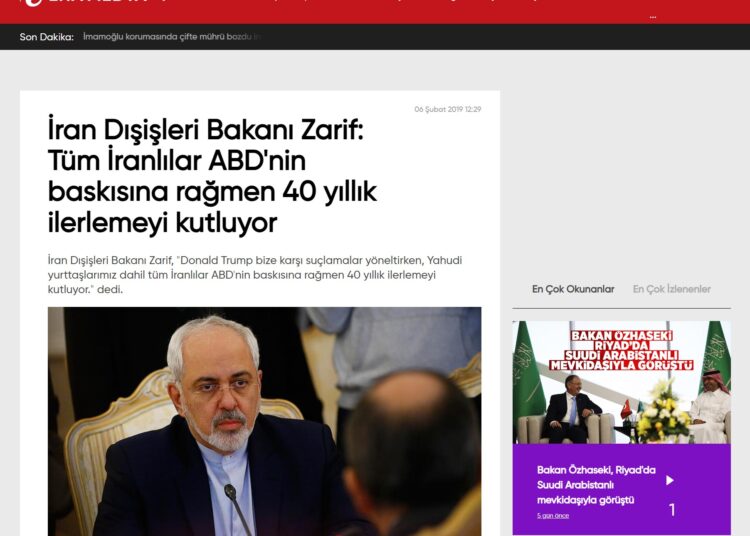Abdullah Bozkurt/Stockholm
An online news outlet that has been producing content in Turkish, English, German and Arabic for the past five years is actually a covert project conceived within the secretive corridors of Turkish intelligence agency MIT in collaboration with the office of the Turkish president. Its primary objective has been to conduct influence operations both within Turkey and on an international scale, advance a specific political agenda, manipulate public opinion and spread propaganda.
Eha Medya, operating under the registered company name of Refleks Medya İletişim A.Ş., was established in 2018 with the aim of promoting the narrative of the government of President Recep Tayyip Erdogan. Notably, its launch coincided with the shutdown of other websites, previously created by the same agency for similar purposes, following exposure during a criminal investigation pursued by a public prosecutor.
This outlet is an integral component of a covert initiative led by Nuh Yılmaz, a former journalist and academic who transitioned into a clandestine role as a secret agent. Yılmaz was entrusted with the mission of manipulating Turkish media through the dissemination of fabrications, half-truths and distorted facts, all at the directive of his superior, former intelligence chief Hakan Fidan.
Serhat Albayrak, CEO of the Turkuvaz Media Group, which is owned by the family of the Turkish president, played a pivotal role in providing logistical and organizational support for these operations. It’s no coincidence that Yılmaz had previously worked for Albayrak during his tenure at Turkuvaz before being recruited into the intelligence agency by Fidan in 2013.
Turkuvaz was established through illicit funds obtained via kickbacks that President Erdogan secured from pro-government businesspeople. These funds were exchanged for favorable government contracts and tenders. Furthermore, several media outlets, including Yeni Asır TV and the Takvim, Yeni Asır and Fotomaç newspapers, were subsequently transferred to Turkuvaz ownership with government assistance under questionable circumstances. The goal was to establish a pro-government media to bolster support for the Erdogan government.
Today Turkuvaz owns numerous media platforms, encompassing print, broadcast and online outlets, among which are well-known government mouthpieces like the Sabah newspaper and the ATV station.
Trade registry data for Refleks Medya İletişim A.Ş., the owner of the Eha Medya brand:
Eha Medya was intentionally not publicly associated with the Turkuvaz group since the intelligence agency aimed to maintain a separation between them. This strategy was employed to create the illusion of Eha Medya being an independent and bipartisan outlet, thereby enhancing its potential for influence.
The attempt to maintain a separation between Eha Medya and the Turkuvaz group fell apart when Refleks, the brand holder of Eha Medya, publicly declared two owners of the company during the registration process with the Chamber of Commerce. According to records obtained by Nordic Monitor, one of the owners is identified as Seyfullah Emin, who in reality has a full-time position as the digital media coordinator at the Turkuvaz Media Group. The other owner is named Doğan Aras.
Even without prior knowledge of Eha Medya’s affiliation as a project of the Erdogan government, one can readily draw a similar conclusion by examining its editorial content. The outlet displays a distinct bias in favor of supporting Erdogan government policies, and its news articles are frequently shared by individuals closely associated with President Erdogan.
Yılmaz, currently serving as chief aide to the foreign minister while overseeing the ministry’s think tank, the Center for Strategic Research (SAM), has been leveraging the investments he made during his time at the intelligence agency. He strategically employs media outlets like Eha Medya to promote his boss, Fidan, portraying him as a highly skilled diplomat who plays a significant role in shaping global politics. This use of media influence underscores the extent to which these operations are intertwined with both intelligence and foreign policy objectives.

It appears that not only Eha Medya but several other online outlets previously operated by the intelligence agency are now being directed to promote Fidan. This situation might persist until Ibrahim Kalin, the new spymaster, gains greater control over the agency’s operations and possibly takes steps to curtail such activities that seem to come at the expense of his own reputation and create a conflict of interest.
Indeed, the complete absence of any criticism or discussion regarding Fidan’s controversial record as the intelligence chief in these outlets is telling in and of itself. The lack of coverage on Fidan’s past involvement in activities such as operating secret torture centers, kidnapping government critics, aiding and abetting armed jihadist groups and staging false flag operations is not surprising given the outlets’ alignment with government interests.
A detailed examination of Eha Medya’s editorial content reveals a discernible anti-Western and antisemitic bias, particularly evident in the Turkish edition. This bias appears to align with the ideological perspective of both Fidan and Yılmaz, who are known to have subscribed to the ideology of the mullah regime in Iran.
Fidan has ties to Shiite circles from his youth, and many of his close associates have served as assets and operatives of Iranian intelligence for extended periods. Some of these individuals came under scrutiny during counterterrorism investigations conducted between 2011 and 2014 due to their links to the IRGC Quds Force. These connections and the ideological alignment of the masterminds behind such influence operations shed light on the editorial direction and content of Eha Medya and others.
An investigation into the Quds Force was derailed when President Erdogan intervened to disrupt the case, preventing the public prosecutor from filing indictments against numerous suspects associated with the Quds Force, including Iranian nationals. Subsequently, some of these suspects were designated under Iran sanctions by the US government.

It’s interesting to note that Yılmaz had previously worked for a Turkish publication in the 1990s that was financially supported by Iran and had a mission to promote the Iranian mullah regime. The magazine faced legal issues and was ultimately shut down by court decision. Furthermore, its managers were indicted and subsequently stood trial, influencing Yılmaz’s later career choices and affiliations.
The content on Eha Medya is virulently antisemitic and often peddles conspiracies under the pretext of reporting news with no critical context such as Jews being behind the September 11, 2001 al-Qaeda attacks in the US, Hitler having Jewish blood and Jews participating in a secret coming-of-age ritual called the “Rite of the Unleavened” that requires Jewish men to kill non-Jewish virgins. On the other hand, it promotes views of jihadist groups such as Hamas’s military wing, the Izz ad-Din al-Qassam Brigades.
The modus operandi employed by Eha Medya, which involves supporting President Erdogan and smearing his critics both in Turkey and abroad, resembles previous operations carried out by the Turkish intelligence agency. Documents published by Nordic Monitor last year revealed that MIT had established multiple websites for the purpose of conducting negative campaigns against Erdogan’s critics.
These websites were notably characterized by their strongly antisemitic and anti-Western content. It’s significant to note that the financing for these websites came from Serhat Albayrak, CEO of the Turkuvaz group and brother of Berat Albayrak, the son-in-law of Turkish President Erdogan.

Yılmaz, who assumed a senior position at MIT in August 2013 under the Erdogan government, discreetly provided much of the content for MIT’s black propaganda websites. These websites, identified as medyagundem.com, medyasavar.com, haber10.com and karakutu.com, were notorious for their dissemination of conspiracy theories against Jews and their promotion of hatred toward them. They also associated critics of Erdogan with Zionist and Western plots, fostering a hostile and divisive narrative.
“The Jews established their system on the destruction and wiping out of everybody except them,” one article published on Medyagundem in July 2014 said. The unsigned article blamed Jews for all wars in the world, claiming that the more the world’s population decreases, the greater the amount of oxygen Jews would get. “Wherever there is a war in the world, even if the Jew is not there, s/he will be involved with weapons and the war industry materiel.”
The articles posted on the site called for a boycott of known international brands such as Coca Cola because every cent spent on a Coke would turn into bullets and bombs used by what it called the “murderous and terrorist Israeli state.” It carried remarks by Erdogan that often described Israel as a terrorist state that was following in Hitler’s footsteps.
After its exposure, the intelligence agency abandoned the websites, with all inaccessible today with the exception of Medyagundem, which has not been updated since 2018, the year Eha Medya was established, most likely to replace the defunct websites.

A complex and multifaceted approach by the Turkish intelligence agency to influence both domestic and international audiences remains one of the top priorities of the Erdogan government, which secured a new mandate to rule Turkey for the next five years in the May 2023 general election. The use of dozens of active websites, including some with far-right and extremist leanings, to push the narrative of the Erdogan government suggests a concerted effort to shape public opinion.
The global reach of these operations, which target audiences in various countries and within diaspora Turkish and Muslim communities, highlights the extent of their influence campaign. The utilization of modern information warfare tactics, including the leveraging of social media platforms, allows the Erdogan government to disseminate harmful narratives and ideas to a wide audience beyond Turkish borders.












